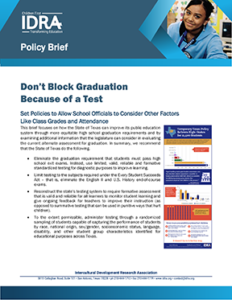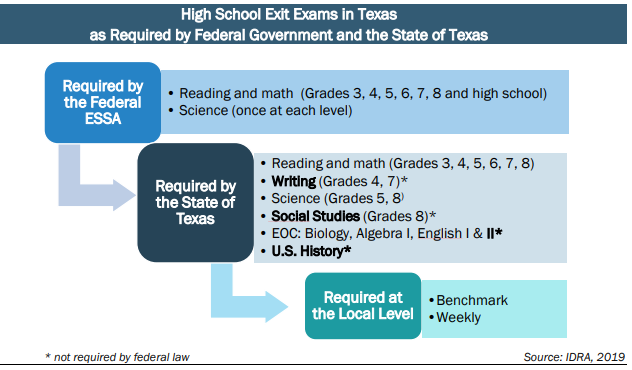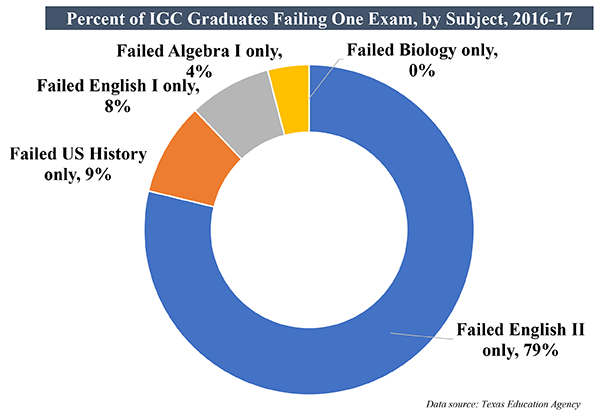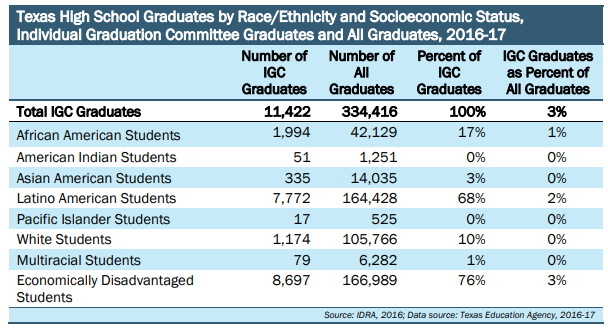Set Policies to Allow School Officials to Consider Other Factors Like Class Grades and Attendance
 (March 5, 2019) This brief focuses on how the State of Texas can improve its public education system through more equitable high school graduation requirements and by examining additional information that the legislature can consider in evaluating the current alternate assessment for graduation. In summary, we recommend that the State of Texas do the following.
(March 5, 2019) This brief focuses on how the State of Texas can improve its public education system through more equitable high school graduation requirements and by examining additional information that the legislature can consider in evaluating the current alternate assessment for graduation. In summary, we recommend that the State of Texas do the following.
- Make the current individual graduation committee (IGCs) policy permanent so that teams of educators, and sometimes a parent or guardian, can evaluate the student’s coursework, effort and attendance in order to determine if the student has mastered the subject and can graduate.
- Eliminate the graduation requirement that students must pass high school exit exams. Instead, use limited, valid, reliable and formative standardized testing for diagnostic purposes to improve learning.
- Limit testing to the subjects required under the Every Student Succeeds Act – that is, eliminate the English II and U.S. History end-of-course exams.
- Reconstruct the state’s testing system to require formative assessment that is valid and reliable for all learners to monitor student learning and give ongoing feedback for teachers to improve their instruction (as opposed to summative testing that can be used in punitive ways that hurt children).
- To the extent permissible, administer testing through a randomized sampling of students capable of capturing the performance of students by race, national origin, sex/gender, socioeconomic status, language, disability, and other student group characteristics identified for educational purposes across Texas.
March 20, 2020 Update: In response to COVID-19, Texas canceled state assessments for spring 2020. High school seniors no longer needed to retake end-of-course exams. Instead, they would be evaluated by Individual Graduation Committees no matter how many EOCs they need to pass.
National and State Trends in Testing and Opportunities to Improve Efficiency under the Every Student Succeeds Act
Texas currently requires students to pass five exit STAAR exams to graduate high school. While some believe that the extensive number of high school exit exams is required under federal law, that is not true. Federal law sets a minimum. Under the Every Student Succeeds Act (ESSA), which was signed into law in December 2015 and replaced the No Child Left Behind Act (NCLB), states are merely required to test students in reading, math and science in high school as shown below. The federal government does not require that Texas mandate passage of these tests for graduation (high-stakes testing), nor does federal law require the additional tests noted below with an asterisk (*) below. Texas, itself, chooses to go beyond minimal federal requirements, expending significant state resources in the process and creating a far less efficient public school system.

In fact, several states have reconsidered the high-stakes consequences attached to state-mandated high school tests. Currently, only 13 states reportedly require students to pass state standardized high school exit exams, the lowest since the 1980s (FairTest, 2017). Public opinion polls also show a growing disenchantment with the obsessive testing era, with 67 percent of parents stating that there is too much emphasis on testing (Gallup, Phi Delta Kappa Poll, 2015).
To be clear, IDRA does not support the elimination of standardized testing. IDRA understands that standardized testing, when valid and reliable, provides important information for students, parents, teachers, administrators, the public and policymakers. Texas, however, has relied too extensively on a flawed testing strategy that wastes tax dollars. Previously, under the NCLB, the state was required to administer summative assessments, but under the ESSA, Texas can choose to move to more formative assessments. IDRA urges the state to do so to help improve learning, especially for low-income and English learner students.
Recent Disaggregated IGC Results in Texas
Alternative assessments for high school graduation authorized pursuant to SB149 (2015) greatly improved opportunities to graduate, particularly for students of color and lower income students. According to the latest TEA data released for the 2016-17 school year, there were 14,735 students assigned an IGC. Of these, 77.5 percent (11,422) were recommended for graduation.
The most recent data from TEA (2016-17 school year) show that the vast majority of IGC graduates failed the two end-of-course exams (EOCs) that are not required for testing by the federal government: English II and U.S. History. Of the 6,172 IGC graduates failing one high school exit exam, 88 percent of students failed either the English II or U.S. History exam. The following chart shows the results for IGC students failing one exam.

In addition, of the 4,510 students failing two EOC exams, fewer than 1 percent failed a combination of exams that did not include either the English II or U.S. History exam.
The table below shows the breakdown of the total number and percentage of IGC graduates and disaggregated data by race/national origin and socioeconomic status (SES) (percentages rounded).

The state expends significant costs of time and resources for the preparation and administration of these tests and could avoid wasting precious tax dollars on these tests. Eliminating the two additional tests and eliminating the high-stakes testing component of the EOCs, would greatly improve the efficiency of the education system by reducing costs, test retakes, and the number of IGC committees required to be formed.
References
Neill, M., & Guisbond, L. (November 2017). Test Reform Victories Surge in 2017: What’s Behind the Winning Strategies? FairTest. http://www.fairtest.org/sites/default/files/FairTest-TestReformVictoriesReport2017.pdf
Richardson, J., & Bushaw, W.J. (2015). Testing Doesn’t Measure Up for Americans, 47th Annual PDK/Gallup Poll of the Public’s Attitudes Toward the Public Schools. Phi Delta Kappa Poll. http://www.shankerinstitute.org/sites/shanker/files/pdkpoll47_2015.pdf


